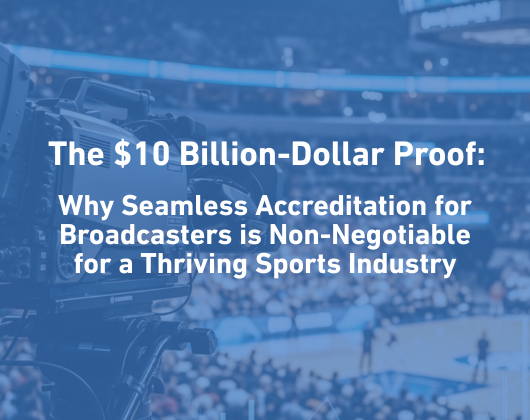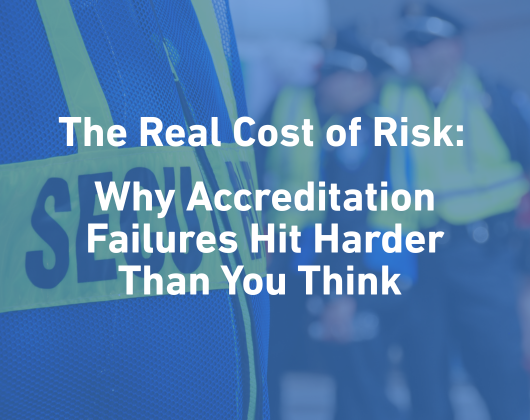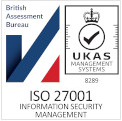We’ve seen our fair share of outbreaks over the past 20 years, with SARs, MERs, bird flu and so on, but not since the Spanish flu back in the 1910s has there been a global pandemic like COVID-19. It has touched all four corners of the world and will have a lasting impact on all industries for years to come. Although vaccines are rolling out and immunity will be gained, the way industries will operate will be a far cry from before. We will all need to operate within a new norm under government guidance or under self-regulation to ensure safety and mitigate risk across the board.
What impact did COVID-19 have on Accreditation last year?
Unprecedented was the word for last year. No one foresaw the impact it would have on their industry or way of life and events were no different. When lockdowns and travel bans came into force the landscape of events changed dramatically. Stadiums, venues, and events were natural places for large groups to congregate together and this could no longer happen. Not whilst we had no real defence against this new disease.
What the events industry needed to get going again was a way to help mitigate the risks, and whilst it would be some time before spectators could be welcomed back into events and venues, it was clear that sporting seasons would need to be continued. The key was finding a way to protect against the possibility of contracting COVID-19 and as we progressed through the pandemic, we realised that accreditation would play a pivotal and central role in getting events up and running again.
Evolving accreditation to meet the needs of the day
For accreditation to achieve this we worked with clients to adapt and ensure it was fit for purpose. Primarily seen as a way to bolster safety and security and protect against the insider threat from crime, terrorism, illegal immigration and unauthorised access, it now needed to evolve to take into account the health and medical condition of each and every person working onsite at a stadium or venue.
In short, we needed to find a way for accreditation to incorporate the collection of health information. More than just collecting test results or certificates, event organisers now needed to risk assess each individual with a working function to determine if they were considered a high risk to COVID-19, had they recently travelled, did they have symptoms, were they part of an older age group or had an existing medical condition that left them susceptible to the virus.
Understanding who was going to collect this data from a contractor, subcontractor, legislative body or the organisation themselves was just as important as identifying what information was required. With some stadiums and events lacking a medical officer to step in and assist, many found themselves in the position of needing to either recruit a COVID-19 officer or train someone already in-house.
They had to establish the data management protocols and security, questions like could they collect data, does it fall under the special interest or legitimate requirements of COVID-19 to ensure they stayed on the right side of data protection laws like GDPR.
Managing the evolving pandemic
As the world progressed through 2020, we experienced a second wave of the virus. Restrictions eased only to be tightened up again as the next wave hit. New government legislations were brought in only to be amended a month or two later. Once events could be held again stadiums and events found themselves needing to adapt to the new normal of operating behind closed doors in a secure bubble, prioritising staff, skeleton operations, social distancing, face masks, health information collected, onsite tests conducted and much more.
In many cases, as an industry, we were learning and adapting as we moved forward. Accreditation changed, with a need to limit the number of people onsite or in interior spaces. Room capacities were reduced, onsite personnel given restricted movement around stadiums and venues, limited or no interaction amongst specific groups was introduced. The access zones and capacity management had increased importance, operational staff across all manners reduced to a minimum, in most cases operating at 10% – 15% of the usual capacity, to control the safety and the integrity of the bubbles created.
You can’t forget about the finance
The final and most impactful attribute of COVID-19 upon major events is financial. No events meant no income from spectators, catering, programme or merchandise sales. Broadcast and sponsorship rights became a financial lifeline which meant events needed to be run and televised. It was clear to see whilst the impact on revenue could have severely hampered the sport or event there was a need and an ability to invest in new COVID-19 solutions for collecting medical and screening information.
The increased need for accreditation
With a robust accreditation system in place, some would already have the tools and technology needed to manage the collection of additional data, onsite access control and tracking and informing existing staff with the new processes and as required.
This is exactly what Accredit Solutions focused on. We’ve worked hard with our clients since the beginning of the pandemic to ensure they have the best tools available to run in a very unique time. We worked with them to ensure the additional financial burden they now faced was mitigated as much as possible through the efficiency our systems provides.
By having the right technology and tools in place we can effectively deal with COVID-19, along with the changing environment and disruption it brings. We’ve been involved first hand in many of the “back to normal” trails that have been run, across multiple sports, and have proved that events and fixtures can run, and run safely. Technology can be a driving force, offer automation and will ultimately allow our industry as a whole to open up and bring some semblance of normality back to the world.





![EAS-Accredit-300dpi[22]](https://www.accredit-solutions.com/wp-content/uploads/2024/01/EAS-Accredit-300dpi22-300x156.png)

